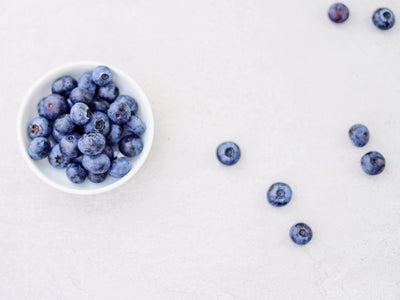25 Science-Backed Ways to Support Your Gut Microbiome: PART 2

The final instalment of our run-down of 25 of the best, research-backed ways to nourish and support your gut microbiome – starting today.
💩 Love dirt!
Squeaky clean, overly sterile environments and plastic-bagged veg do nothing to promote the biodiversity of your gut bacteria; quite the opposite.
In fact, increasing evidence suggests[1] that the recent rise in allergic and autoimmune disorders is at least partly due to our lack of contact with the microorganisms that once covered our food and us.
If you really want to replenish your microbiome, you need to get outside and immerse yourself in nature. Get dirty: mess around in mud, go swimming in wild rivers, take off your shoes[2] and walk on the grass, touch some plants, feel sand between your toes, take a hike through the mountains. Where possible, ditch the hand sanitisers and chemical-loaded cleaning products. Eat organic and don’t over-wash your foods. If you live in the city and are garden-less, grow house plants and windowsill herbs, and try taking a soil-based probiotic (a dietary supplement derived from ancient soils) to boost your microbial diversity.
🍅 Eat a variety of fruit and veg
It might be one of the oldest tricks in the book, but eating a wide range of plants – from broccoli to berries and cabbage to coriander, is one of the smartest moves you can make for gut health. And when we say a wide range, we mean wide. According to data from the American Gut Project[3], "No matter the diet they subscribed to, participants who ate more than 30 different plant types per week had gut microbiomes that were more diverse than those who ate 10 or fewer types of plants per week." Start loading that plate up with colourful plants - pronto!
☁️ Stress less
Making an effort to de-stress can have a major impact on the wellbeing of your gut. Research shows that prolonged periods of stress can damage your gut bacteria[4] and make you more susceptible to infection. Meditation, yoga (in fact any form of exercise) and breathing exercises can all help alleviate anxiety, as well as laying off stimulants like caffeine and sugar and making sure you get enough sleep each night.
🍴 Give intermittent fasting a go
Intermittent fasting is thought by some scientists[5] to be one of the most effective ways to change your gut microbiome for the better – boosting the diversity and abundance of beneficial bacteria.
This does not have to mean ( if health or circumstances mean you cannot do full fasting 'windows') that you have to stop eating altogether however. In order to feed the microbiome, it’s absolutely vital that you consume a diverse range of foods. What it might mean, is that having the occasional lower-calorie day could kick-start changes in the levels of ‘good’ bacteria found in your gut. Experiment with one (roughly) 600 calorie day a week for a few weeks, and see if you notice any improvements in how you feel.
🐕 Swap some microbes with your pet
Research shows that the animals we share our homes with harbour a varied and unique microbial community that is passed on to us, positively influencing our own microbiome – and therefore our health. One study revealed that families that own dogs boast a more diverse and different set of skin bacteria[6] compared with non-dog owning families. Essentially, the more animals you touch, the more you’re swapping health-giving bacteria – so now you’ve got one more research-backed excuse to show your furry friend some love!
☔ Address leaky gut syndrome
In order to take in nutrients, the gut has to be able to absorb to miniscule molecules. A tightly woven layer of cells regulates this permeability – standing guard and stopping any toxins, microbes or undigested food particles escaping from your intestine and leaking into the rest of your body. When this barrier breaks apart – usually after an infection, a course of antibiotics or just a poor diet (some scientists are even linking it to EMFs - with more research to come in this area) - you get ‘leaky gut syndrome’. Leaky gut is characterised by pain, gas, bloating, cramps, tiredness and food sensitivities, and it’s no fun. The good news? A change in diet – to one that promotes the growth of friendly bacteria – can help to remedy it. Collagen is particularly helpful for those with a leaky gut, and can be bought as a supplement (always choose organic) and added to smoothies and teas. Alternatively, try cooking up a gut-soothing bone broth using an organic chicken carcass.
💦 Sweat it out in a sauna
Sweating it out in regular infrared sauna sessions is proven to promote detoxification, boost circulation and lymphatic flow, improve sleep quality and – crucially – relieve stress and anxiety; leaving you in a serene, relaxed state: all of which will go a long way in helping to keep your microbiome happy.
🍜 Include probiotic foods
Probiotics are live, beneficial bacteria. By consuming them – either in supplement or food form - you introduce them to your digestive system, thereby increasing the population of ‘good guys’ in your gut and crowding out unwanted pathogens, yeasts and parasites. One of the best ways to maintain your levels of beneficial bacteria is simply to eat foods that are rich in them. Probiotic-rich foods include: bio yoghurt, apple cider vinegar and fermented foods like miso, kefir, unpasteurised sauerkraut and kimchi. If dairy works for you, then cheese can be another good source of probiotics - just make sure it is organic and preferably raw, unpasterised goats or sheeps' cheese.
🍌 Include prebiotic foods
Whilst less well known than probiotics, prebiotics are just as important for gut health[7]. A special type of plant fibre that can’t be easily digested, prebiotics give your gut a good workout – acting like a kind of intestinal fertiliser; feeding the growth of ‘good’ bacteria and weeding out the bad. Great examples of prebiotic foods include: Jerusalem artichoke, onions, leeks, garlic, chicory, chickpeas, asparagus, apples and bananas.
💊 Be considered with antibiotic use
Unfortunately, in killing off harmful bacteria, antibiotics destroy the good, too. In a report[8] published in the Gut Journal, scientists recorded a host of adverse antibiotic effects on the digestive system, immune system and metabolic system, even finding links between an increased risk of obesity and stress-related disorders and antibiotic use. If you’re prescribed antibiotics, there’s no reason to panic. Just remember to enrich your diet with foods that will support natural bacteria replenishment - and consider taking an effective probiotic supplement to help get your gut back in balance.
🍊 Feast on flavonoids
Flavonoids are a type of phytonutrient concentrated in the skins of fruit and veg. Powerful antioxidants, they can help fight inflammation, infection and allergies, as well as encouraging the body to burn fat. Find them in parsley, apples, celeriac, chamomile tea, grapefruit, oranges and tomatoes.
☕…and polyphenols
Another type of phytonutrient, polyphenols have a range of antioxidant and anti-inflammatory properties, and have been linked with improved gut bacteria diversity. According to new research,[9] eating polyphenols improves your gut health and could even lead to a 20% lower risk of obesity. Many herbs and spices – such as thyme, turmeric, oregano, ginger and basil – are known to be high in polyphenols, alongside green tea, olive oil, coffee, red wine and various fruits and vegetables.
🌿 Up your fibre intake - from plants
In a typical Western diet, we consume less than half the recommended amount of fibre – eating unadventurous, overwhelmingly beige foods. Rather than filling up on processed carbs like cereal, bread, pasta and cakes, try to get your fibre fix from whole plants instead. Stick to high-fibre, low-GI options like sweet potatoes, leafy greens, legumes and cruciferous vegetables – and snack on fruit, nuts, flaxseeds and chia seeds to stabilise your blood sugar levels and keep hunger at bay. Whilst helping you to develop a more diverse population of gut microbes[10], eating a high-fibre, plant-based diet will also encourage the growth of microbial species that ferment fibre into short-chain-fatty-acids (SCFAs), capable of enhancing immunity and regulating digestive health.
References
[1] http://humanfoodproject.com/ny-timesarticle-lets-add-little-dirt-our-diet/
[2] https://neurohacker.com/gut-health-microbiome-dr-zach-bush-m-d
[3] https://ucsdnews.ucsd.edu/feature/whats-in-your-gut
[4] https://pubmed.ncbi.nlm.nih.gov/20941511/
[5] https://www.ncbi.nlm.nih.gov/pmc/articles/PMC4452615/
[6] http://humanfoodproject.com/swapping-microbes-with-your-dog/
[7] http://humanfoodproject.com/probiotics-or-prebiotics-which-would-darwin-choose/
[8] https://gut.bmj.com/content/64/11/1732
[9] https://twinsuk.ac.uk/eat-yourself-slim-molecules-found-in-plants-linked-to-reduced-risk-of-obesity/
































